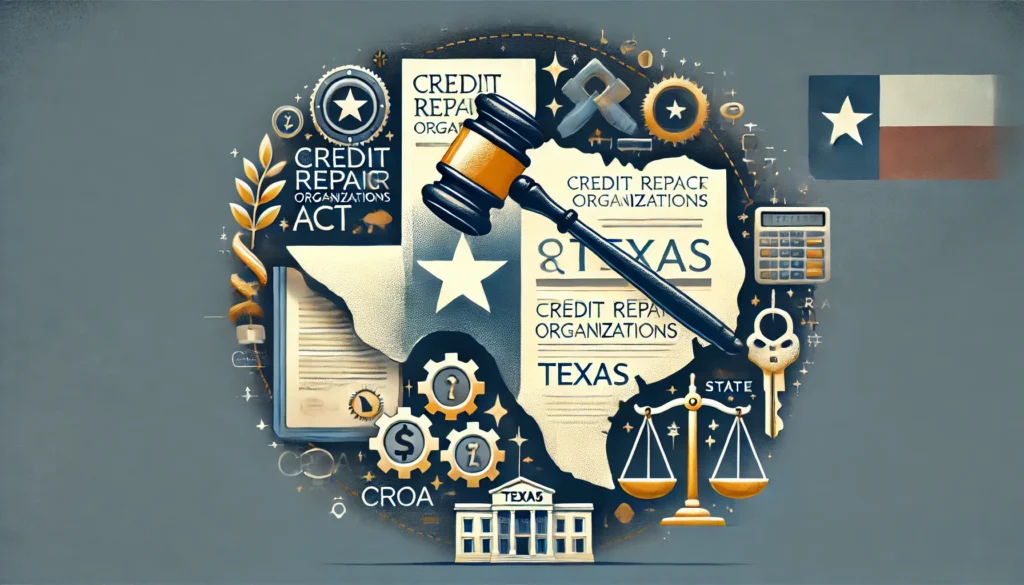Credit repair offers hope to people who want to improve their credit scores and build a better financial future. Having a good credit score is very important. It helps when getting loans, getting low interest rates, and renting an apartment. With credit repair, individuals can take charge of their financial stories. They can fix mistakes and deal with negative items that may be slowing them down.

Understanding the Landscape of Credit Repair in Texas
The credit repair industry in Texas is growing fast. More people are realizing how important credit is. Many individuals struggle to keep a good credit profile. As a result, more people are looking for help with their credit reports and scores. This means there is a high demand for skilled credit repair professionals.
Texas has a strong economy and a mix of many different people. This makes it a great place for credit repair businesses. The state’s rules and the need for ethics in the industry show that ongoing education is needed. This helps businesses stay compliant and offer valuable services.
The Growing Demand for Credit Repair Services
The credit repair industry is growing quickly. This growth comes from things like shifts in the economy, rising consumer debt, and a better understanding of why a good credit score matters. More and more people from different backgrounds want help to improve their finances.
This increase in interest offers a big chance for credit repair businesses in Texas. Many consumers see that getting professional help is useful when dealing with the tricky credit system. Credit repair experts can assist clients in fixing mistakes, contesting errors, and using good credit management to reach their financial goals.
However, this comes with more responsibility. Credit repair companies need to focus on doing things the right way. They should be open about their practices and make sure they keep learning to effectively help their clients and protect the industry’s honesty.
Regulatory Framework and Compliance in Texas
Navigating credit repair in Texas means you need to know the state’s rules and the federal laws, like the Credit Repair Organizations Act (CROA). These laws help protect consumers from dishonest practices and make sure credit repair businesses work fairly.

It’s very important to act ethically in the credit repair industry. Credit repair companies should keep client information private. They also need to be clear about their prices and services. They should not make promises that are hard to keep. Building trust by communicating openly and being honest is key for long-term success.
By staying updated on state regulations, following ethical practices, and focusing on educating clients, credit repair businesses in Texas can build a good reputation. This will help create a fair and healthy credit environment.
The Role of Continuous Education in Credit Repair Success
In the fast-changing world of credit repair, learning all the time is a must for lasting success. Credit laws, reporting Customs, and industry rules are always changing. So, credit repair professionals need to keep up. By committing to ongoing learning, they not only improve their skills but also offer the best and most honest services to their clients.
Additionally, ongoing education helps credit repair specialists meet the changing needs of their clients. As more people become aware of their finances, clients want to work with smart and trustworthy experts. By focusing on continuous learning, credit repair specialists show that they care about giving great customer service and achieving the best results for their clients.
Keeping Up with Changing Laws and Regulations
Credit laws and rules can change. This is why credit repair professionals need to keep updated on any news or changes. The Fair Credit Reporting Act (FCRA) is important for protecting consumers. It explains the rights people have about their credit reports and how their information is collected and used.
Being aware of changes to the FCRA, as well as other state and federal rules, is crucial to stay compliant. It helps ensure that all credit repair actions are legal and ethical. Not following these rules could lead to penalties, legal issues, and harm to a business’s reputation.
Credit repair professionals can stay informed by signing up for industry newsletters. They can also attend webinars and take ongoing education courses. This way, they can learn the latest updates and best practices, which helps protect their businesses and their clients’ interests.
Advancing Skills and Knowledge to Enhance Service Quality
Continuous learning is very important in the credit repair industry. It helps professionals to improve their skills and gain more knowledge. This, in turn, allows them to provide better services to their clients. Credit repair training programs and workshops give a chance to learn more about specific topics. These can include dispute resolution techniques, credit scoring models, and debt management strategies.
When credit repair specialists focus on professional growth, they stand out from others in the field. This shows clients that they are serious about providing great services. Clients tend to trust and recommend professionals who work hard to stay updated in their area.
Having better skills and knowledge allows credit repair specialists to help a wider variety of clients. Whether they are dealing with tricky credit issues or offering financial counseling, continuing to learn means they can meet their clients’ needs effectively and confidently.
Key Areas of Ongoing Education for Credit Repair Professionals
To succeed in the tough credit repair industry, professionals need to focus on continuous learning. This education should be in important areas that help them give great service and get the best results for their clients. It’s important to understand both legal and financial matters.
Credit repair professionals should look for chances to improve their understanding of the legal side of credit repair in the United States. This includes knowledge of the Fair Credit Reporting Act, local laws, and ethical business practices. They should also work on financial counseling skills for different clients. This will help clients make smart choices and reach long-term financial stability.
Legal Aspects of Credit Repair in the United States
A good understanding of credit repair law is essential for professionals in the United States. The Credit Repair Organizations Act (CROA) sets rules on how credit repair businesses should deal with consumers. This helps to keep practices fair and clear.
Knowing the details of credit repair law helps professionals create ethical business practices. They can do this by offering clear contracts, listing all fees upfront, and avoiding false ads or promises. Following CROA is not just a legal requirement; it shows a business’s honesty and dedication to doing things the right way.
It is also important to keep up with any changes to credit repair law. This aids in staying compliant and maintaining high ethical standards. Credit repair professionals should stay alert and learn more to match their practices with the changing laws.
Financial Counseling Techniques for Diverse Clientele
Effective credit repair is more than just fixing mistakes on credit reports. It also involves giving clients the tools and knowledge they need to handle their credit. Financial counseling helps clients make strong financial choices and reach long-term stability.
When credit repair professionals include financial counseling in their services, they can teach clients about budgets, managing debt, and using credit cards wisely. This builds a strong base of financial knowledge, which helps gain client trust and supports lasting improvements.
Credit repair professionals should also customize their financial counseling to fit the different needs of each client. Every client comes with their own financial background, goals, and issues. By personalizing the counseling, they can build better relationships with clients and improve the chances of successful results.
Implementing Best Practices in Credit Repair
Credit repair professionals need more than just knowledge. They must implement best practices that bring good results, save time, and keep clients happy. This means they should be great at resolving disputes and using technology to improve how they work and ensure accuracy.
It’s very important to create good strategies for dispute resolution. Knowing how to talk with credit bureaus, spot and dispute negative items, and show strong evidence can greatly influence a client’s credit repair journey. Also, using credit repair software helps manage client information better, follow progress, and create reports accurately.
Strategies for Effective Dispute Resolution
Mastering how to resolve disputes is very important for credit repair professionals. They need to challenge mistakes and negative items on their clients’ credit reports. This means they must understand how credit bureaus work, the types of disputes they can file, and what evidence is needed for each claim.
To start effective dispute resolution, it is crucial to look closely at the client’s credit report. Find any inaccurate, outdated, or unverified information. Once that is done, the next step is to write strong dispute letters. These letters should explain the issues clearly, mention any relevant laws, and include supporting documents. Being persistent is very important. It may take several communications with credit bureaus before getting a good result.
Credit repair professionals also need to be ready to escalate disputes if needed. They should use every way possible to defend their clients’ rights. This could mean contacting the Consumer Financial Protection Bureau (CFPB) or getting legal help for more complex situations. Mastering dispute resolution is a continuous process. Professionals must keep refining their skills to ensure their clients get the best representation in their credit repair journey.
Utilizing Technology for Efficiency and Accuracy
In the tech-driven world we live in, using credit repair software is a must for credit repair businesses. It helps them work better, be more accurate, and keep their clients happy. This software has many features that make operations smoother, cut down on mistakes, and boost productivity.
Credit repair software makes it easy to bring in and handle client information. It automates tasks like writing dispute letters, tracking progress among different credit bureaus, and making detailed reports. By automating these tasks, credit repair professionals can spend more time helping their clients with personal advice and support.
Also, credit repair software helps keep things accurate. It lowers the risk of mistakes that can happen with manual work. With awesome features like automated checks, safe document storage, and live updates, businesses can work with more trust. They can be sure their clients’ information is safe and managed well.
Building Credibility through Education and Certification
In a competitive market, it is important for credit repair professionals to build and keep credibility. This helps them attract and keep clients. While having experience is helpful, potential clients want to see clear signs of skill. That is why education and certification are very important.
Getting recognized certifications in the credit repair industry shows a dedication to following ethical rules. It also means that the professional stays updated on the best practices, and understands the credit laws and regulations well. This builds client trust and helps professionals be seen as reliable experts in their field.
Importance of Accreditation in the Credit Repair Industry
In the credit repair industry, getting accredited shows a professional’s skills and moral standards. For clients, accreditation helps them find reliable help. When credit repair specialists earn certifications, they stand out in a busy market.
Accreditation shows potential clients that a credit repair specialist has taken the time to learn about the industry, follow ethical rules, and keep up with important laws. This builds trust and confidence, which are crucial for strong client relationships.
Also, accreditation can help credit repair specialists connect with other finance experts, growing their network. Many companies and financial institutions want to work with accredited professionals because they value their knowledge and ethical behavior.
Selecting the Right Educational Programs and Certifications
With many educational resources and certifications out there, credit repair professionals should choose programs that fit their career goals. They need programs that can boost their skills and give them useful credentials. It’s important to research which programs are respected in the industry and have thorough courses.

When picking credit repair education, look for programs that teach important subjects like the Fair Credit Reporting Act, techniques for resolving disputes, credit scoring models, and good business practices. Gaining hands-on training and mentorship can offer valuable real-world experience, helping to connect what you learn to actual practice.
Also, focus on professional growth opportunities that give ongoing support, continuing education credits, and a chance to connect with others in the field. Putting money into solid credit repair education helps not just yourself but also your business, leading to lasting success and happy clients.
Leveraging Education to Enhance Client Relationships
Education in credit repair is important for both personal and professional growth. It helps build strong relationships with clients based on trust, openness, and a common goal of achieving good financial health. When credit repair professionals share their knowledge, they become reliable advisors.
Teaching clients about credit management helps them make smart choices. It encourages them to take control of their financial future and stay away from credit problems in the future. Educating clients also promotes open communication. This way, clients can take part in the credit repair process and understand the methods used for their benefit.
Educating Clients on Credit Management
Empowering clients through credit education is key to responsible and effective credit repair. When clients understand how credit works, credit repair professionals can help them make better financial choices and reach their financial goals.

The education process often starts with a detailed look at their credit report. Professionals explain the sections of the report, how credit scores are figured, and what can improve or hurt their credit. This understanding helps clients see their current credit status and spot areas they can improve.
Additionally, credit repair experts teach clients how to handle their credit responsibly. This includes paying bills on time, keeping credit usage low, and avoiding unnecessary debt. By encouraging clients to take charge of their financial health, credit repair specialists help create lasting positive changes.
Creating Long-Term Plans for Financial Health
Addressing credit issues is very important. However, successful credit repair goes beyond quick fixes. It focuses on helping clients achieve long-term financial health and stability. Credit repair professionals work with clients to develop personal financial plans. This shows they care about their clients’ well-being, not just improving credit scores.
Long-term financial planning should look at the client’s whole financial picture. This includes budgeting, saving, debt management, and setting future financial goals. Credit repair professionals can use their skills to help clients create realistic budgets. They can also guide them in building emergency funds and finding investment options.
When clients feel empowered to manage their money and make smart choices, it boosts their overall well-being. This leads to a sense of pride and happiness. As a result, it creates strong client loyalty, positive recommendations, and a successful credit repair business.
Conclusion
In conclusion, ongoing education is very important for credit repair professionals to succeed. They need to stay updated on changing laws, improve their skills, and keep their credibility through certifications. This helps them provide good services to their clients. By learning more, professionals can solve problems better, use technology well, and build stronger relationships with clients.
Education helps both the professionals and their clients, leading to better results for those looking for financial stability. It is essential to promote a learning culture in the credit repair industry. This way, they can keep up with changes and deliver high-quality services. Start your journey to success in credit repair by focusing on continuous education.
Frequently Asked Questions
What is the importance of ongoing education in credit repair?
Ongoing education is very important for success in credit repair. It helps professionals keep up with new industry trends. It also helps them follow changing laws. By learning more, they can use best practices. This builds client trust and provides great service.
How does staying updated with laws benefit credit repair professionals?
Staying updated with laws helps credit repair professionals follow rules and keep their work ethical. This also protects their businesses from legal problems. When they do this, they build a trustworthy reputation. This can lead to business growth.
What certifications are beneficial for credit repair specialists in Texas?
Certifications from respected groups, such as the Credit Consultants Association (CCA) or the National Association of Credit Services Organizations (NACSO), build trust in a credit repair specialist’s skills. They show that the specialist knows the laws in Texas. These certifications also offer valuable insights that can help in credit repair work.
How can credit repair education improve client satisfaction?
Credit repair education helps professionals give better service. It allows them to guide clients to financial stability. They use accurate information and effective strategies. Great customer service also plays a big role. This leads to happier clients.
